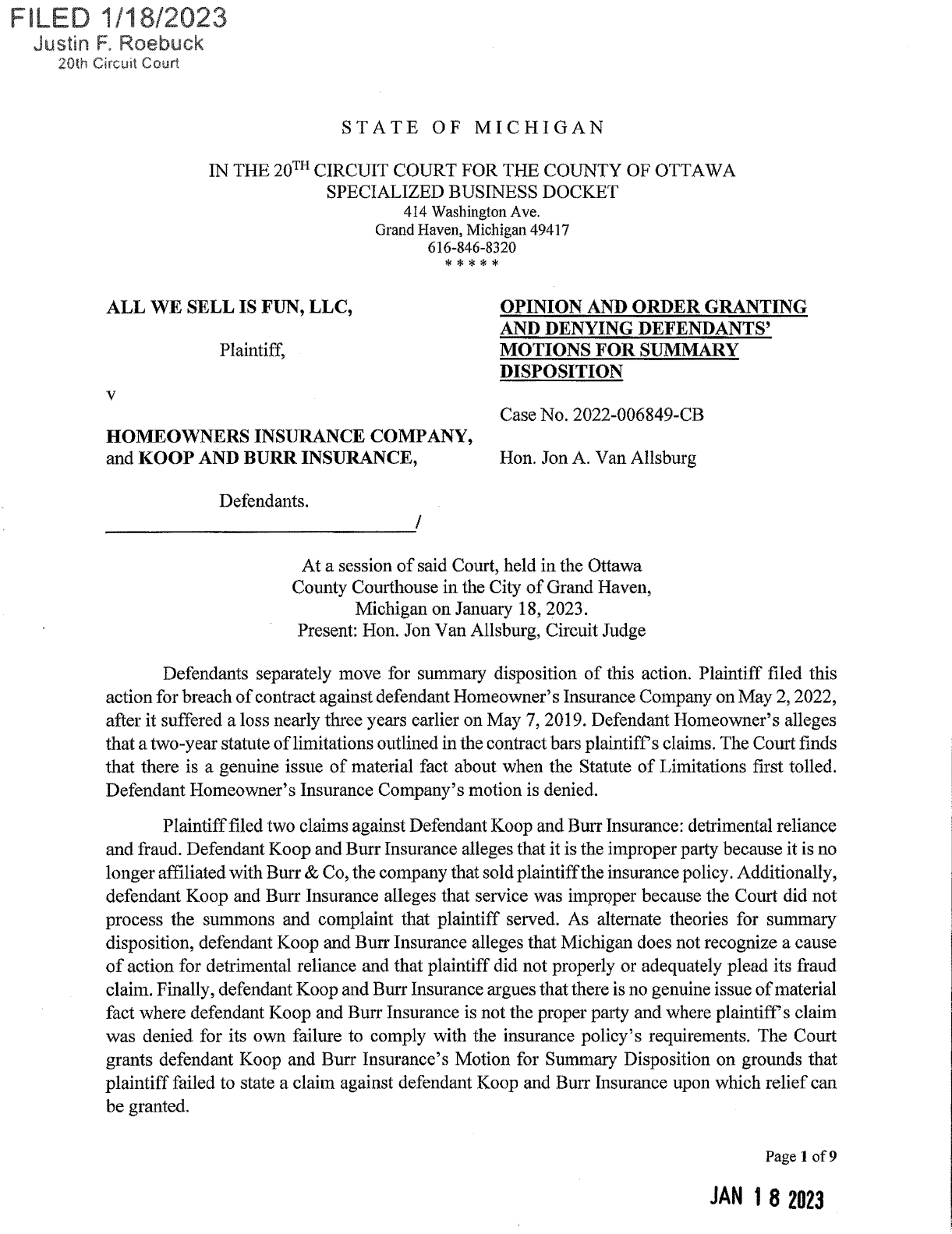
STATE
OF
MICHIGAN
IN THE
20TH
CIRCUIT COURT FOR THE COUNTY OF OTTAWA
SPECIALIZED BUSINESS DOCKET
414 Washington Ave.
Grand Haven, Michigan 49417
616-846-8320
* * * * *
ALL
WE
SELL IS FUN, LLC,
Plaintiff,
OPINION AND ORDER GRANTING
AND DENYING DEFENDANTS'
MOTIONS FOR SUMMARY
DISPOSITION
V
Case No. 2022-006849-CB
HOMEOWNERS INSURANCE COMPANY,
and KOOP AND BURR INSURANCE, Hon. Jon A. Van Allsburg
Defendants.
I
--------------
At a session
of
said Court, held in the Ottawa
County Courthouse in the City
of
Grand Haven,
Michigan on January 18, 2023.
Present: Hon. Jon Van Allsburg, Circuit Judge
Defendants separately move for summary disposition
of
this action. Plaintiff filed this
action for breach
of
contract against defendant Homeowner' s Insurance Company on May 2, 2022,
after it suffered a loss nearly three years earlier on May 7, 2019. Defendant Homeowner' s alleges
that a two-year statute oflimitations outlined in the contract bars plaintiff's claims. The Court finds
that there is a genuine issue
of
material fact about when the Statute
of
Limitations first tolled.
Defendant Homeowner's Insurance Company's motion is denied.
Plaintiff filed two claims against Defendant Koop and Burr Insurance: detrimental reliance
and fraud. Defendant Koop and Burr Insurance alleges that it is the improper party because it is no
longer affiliated with Burr & Co, the company that sold plaintiff the insurance policy. Additionally,
defendant Koop and Burr Insurance alleges that service was improper because the Court did not
process the summons and complaint that plaintiff served. As alternate theories for summary
disposition, defendant Koop and Burr Insurance alleges that Michigan does not recognize a cause
of
action for detrimental reliance and that plaintiff did not properly or adequately plead its fraud
claim. Finally, defendant Koop and Burr Insurance argues that there is no genuine issue
of
material
fact where defendant Koop and Burr Insurance is not the proper party and where plaintiff's claim
was denied for its own failure to comply with the insurance policy's requirements. The Court
grants defendant Koop and Burr Insurance's Motion for Summary Disposition on grounds that
plaintiff failed to state a claim against defendant Koop and Burr Insurance upon which relief can
be granted.
Pagel
of9
JAN
1 8
2023
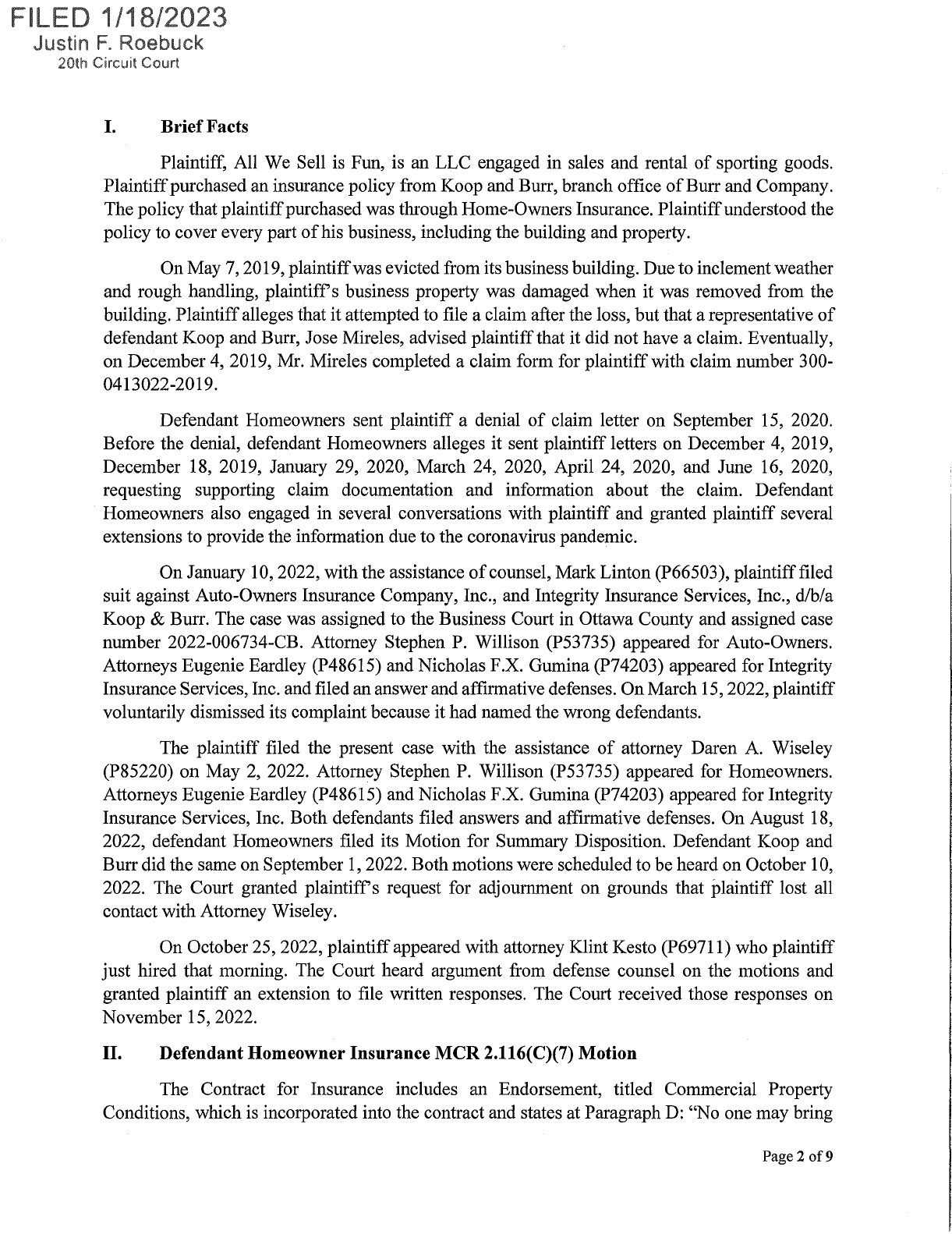
I. Brief Facts
Plaintiff, All We Sell is Fun, is an LLC engaged in sales and rental
of
sporting goods.
Plaintiff purchased an insurance policy from Koop and Burr, branch office
of
Burr and Company.
The policy that plaintiff purchased was through Home-Owners Insurance. Plaintiff understood the
policy to cover every part
of
his business, including the building and property.
On May 7, 2019, plaintiff was evicted from its business building. Due to inclement weather
and rough handling, plaintiffs business property was damaged when it was removed from the
building. Plaintiff alleges that it attempted to file a claim after the loss, but that a representative
of
defendant Koop and Burr, Jose Mireles, advised plaintiff that it did not have a claim. Eventually,
on December 4, 2019, Mr. Mireles completed a claim form for plaintiff with claim number 300-
0413022-2019.
Defendant Homeowners sent plaintiff a denial
of
claim letter on September 15, 2020.
Before the denial, defendant Homeowners alleges it sent plaintiff letters on December 4, 2019,
December 18, 2019, January 29, 2020, March 24, 2020, April 24, 2020, and June 16, 2020,
requesting supporting claim documentation and information about the claim. Defendant
Homeowners also engaged in several conversations with plaintiff and granted plaintiff several
extensions to provide the information due to the coronavirus pandemic.
On January 10, 2022, with the assistance
of
counsel, Mark Linton (P66503), plaintiff filed
suit against Auto-Owners Insurance Company, Inc., and Integrity Insurance Services, Inc., d/b/a
Koop & Burr. The case was assigned to the Business Court in Ottawa County and assigned case
number 2022-006734-CB. Attorney Stephen P. Willison (P53735) appeared for Auto-Owners.
Attorneys Eugenie Eardley (P48615) and Nicholas F.X. Gumina (P74203) appeared for Integrity
Insurance Services, Inc. and filed an answer and affirmative defenses. On March 15, 2022, plaintiff
voluntarily dismissed its complaint because it had named the wrong defendants.
The plaintiff filed the present case with the assistance
of
attorney Daren
A.
Wiseley
(P85220)
on
May 2, 2022. Attorney Stephen
P.
Willison (P53735) appeared for Homeowners.
Attorneys Eugenie Eardley (P48615) and Nicholas F.X. Gumina (P74203) appeared for Integrity
Insurance Services, Inc. Both defendants filed answers and affirmative defenses. On August 18,
2022, defendant Homeowners filed its Motion for Summary Disposition. Defendant Koop and
Burr did the same on September
1,
2022. Both motions were scheduled to be heard on October 10,
2022. The Court granted
plaintiffs
request for adjournment on grounds that plaintiff lost all
contact with Attorney Wiseley.
On October 25, 2022, plaintiff appeared with attorney Klint Kesto (P69711) who plaintiff
just hired that morning. The Court heard argument from defense counsel on the motions and
granted plaintiff an extension to file written responses. The Court received those responses on
November 15, 2022.
II.
Defendant Homeowner Insurance MCR 2.116(C)(7) Motion
The Contract for Insurance includes an Endorsement, titled Commercial Property
Conditions, which is incorporated into the contract and states at Paragraph D: "No one may bring
Page 2
of9
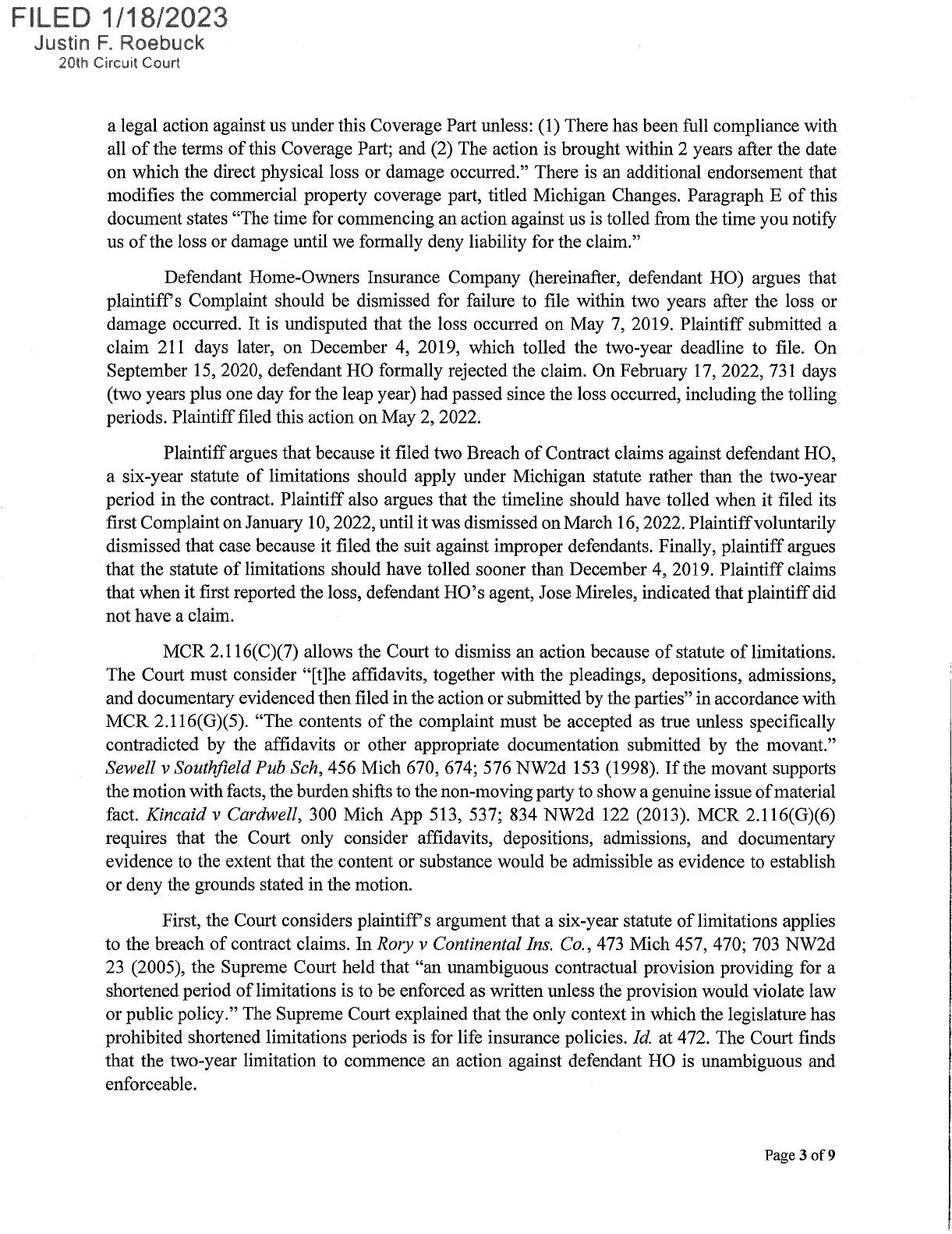
a legal action against us under this Coverage Part unless: (1) There has been full compliance with
all
of
the terms
of
this Coverage Part; and (2) The action is brought within 2 years after the date
on which the direct physical loss or damage occurred." There is an additional endorsement that
modifies the commercial property coverage part, titled Michigan Changes. Paragraph E
of
this
document states "The time for commencing an action against us is tolled from the time you notify
us
of
the loss or damage until we formally deny liability for the claim."
Defendant Home-Owners Insurance Company (hereinafter, defendant HO) argues that
plaintiffs Complaint should be dismissed for failure to file within two years after the loss or
damage occurred. It is undisputed that the loss occurred on May
7,
2019. Plaintiff submitted a
claim
211
days later, on December 4, 2019, which tolled the two-year deadline to file. On
September 15, 2020, defendant HO formally rejected the claim. On February 17, 2022,
731
days
(two years plus one day for the leap year) had passed since the loss occurred, including the tolling
periods. Plaintiff filed this action on May
2,
2022.
Plaintiff argues that because it filed two Breach
of
Contract claims against defendant HO,
a six-year statute
of
limitations should apply under Michigan statute rather than the two-year
period in the contract. Plaintiff also argues that the timeline should have tolled when it filed its
first Complaint on January 10, 2022, until it was dismissed on March 16, 2022. Plaintiff voluntarily
dismissed that case because it filed the suit against improper defendants. Finally, plaintiff argues
that the statute
of
limitations should have tolled sooner than December 4, 2019. Plaintiff claims
that when it first reported the loss, defendant
HO's
agent, Jose Mireles, indicated that plaintiff did
not have a claim.
MCR
2.1
l 6(C)(7) allows the Court to dismiss an action because
of
statute
of
limitations.
The Court must consider "[t]he affidavits, together with the pleadings, depositions, admissions,
and documentary evidenced then filed in the action or submitted by the parties" in accordance with
MCR
2.l
16(G)(5). "The contents
of
the complaint must be accepted as true unless specifically
contradicted by the affidavits or other appropriate documentation submitted by the movant."
Sewell v Southfield Pub Sch, 456 Mich 670, 674; 576 NW2d
153
(1998).
If
the movant supports
the motion with facts, the burden shifts to the non-moving party to show a genuine issue
of
material
fact. Kincaid v Cardwell, 300 Mich App 513, 537; 834 NW2d 122 (2013). MCR 2.116(G)(6)
requires that the Court only consider affidavits, depositions, admissions, and documentary
evidence
to
the extent that the content or substance would be admissible as evidence to establish
or deny the grounds stated in the motion.
First, the Court considers plaintiffs argument that a six-year statute
of
limitations applies
to the breach
of
contract claims. In Rory v Continental Ins. Co.,
473
Mich 457, 470;
703
NW2d
23
(2005), the Supreme Court held that "an unambiguous contractual provision providing for a
shortened period
of
limitations is to be enforced as written unless the provision would violate law
or public policy." The Supreme Court explained that the only context in which the legislature has
prohibited shortened limitations periods is for life insurance policies.
Id.
at 472. The Court finds
that the two-year limitation to commence an action against defendant HO is unambiguous and
enforceable.
Page 3
of9
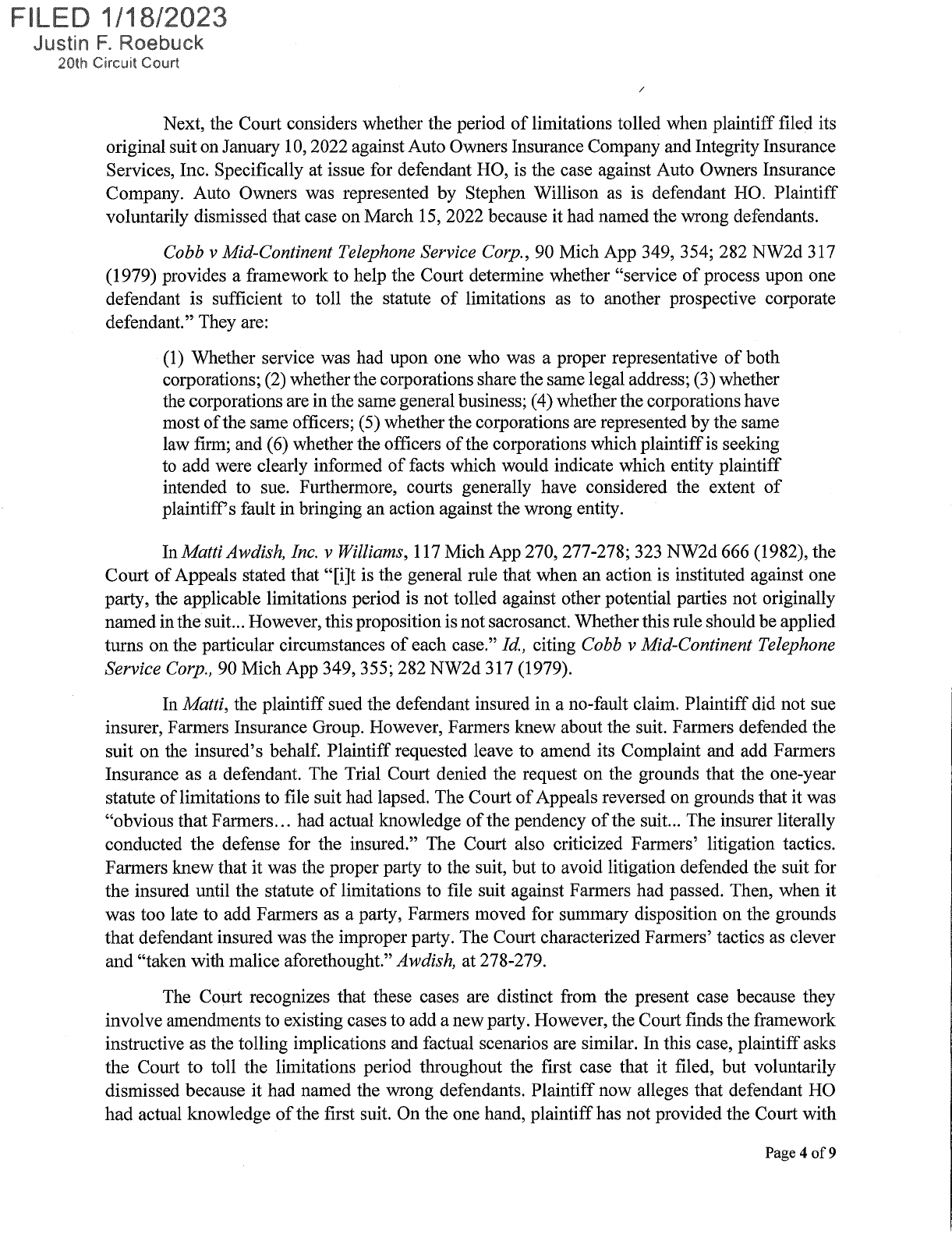
/
Next, the Court considers whether the period
of
limitations tolled when plaintiff filed its
original suit on January
10,
2022 against Auto Owners Insurance Company and Integrity Insurance
Services, Inc. Specifically at issue for defendant HO, is the case against Auto Owners Insurance
Company. Auto Owners was represented by Stephen Willison as is defendant HO. Plaintiff
voluntarily dismissed that case on March
15,
2022 because it had named the wrong defendants.
Cobb v Mid-Continent Telephone Service Corp., 90 Mich App 349,354; 282 NW2d 317
(1979) provides a framework to help the Court determine whether "service
of
process upon one
defendant is sufficient to toll the statute
of
limitations as to another prospective corporate
defendant." They are:
(1)
Whether service was had upon one who was a proper representative
of
both
corporations; (2) whether the corporations share the same legal address; (3) whether
the corporations are in the same general business; ( 4) whether the corporations have
most
of
the same officers; (5) whether the corporations are represented by the same
law firm; and (
6)
whether the officers
of
the corporations which plaintiff
is
seeking
to
add were clearly informed
of
facts which would indicate which entity plaintiff
intended to sue. Furthermore, courts generally have considered the extent
of
plaintiffs fault in bringing an action against the wrong entity.
In
Matti Awdish,
Inc.
v Williams, 117 Mich App 270, 277-278; 323 NW2d 666 (1982), the
Court
of
Appeals stated that "[i]t is the general rule that when an action is instituted against one
party, the applicable limitations period is not tolled against other potential parties not originally
named in the suit... However, this proposition is not sacrosanct. Whether this rule should be applied
turns on the particular circumstances
of
each case."
Id,
citing Cobb v Mid-Continent Telephone
Service Corp.,
90
Mich App 349,355; 282 NW2d 317 (1979).
In
Matti, the plaintiff sued the defendant insured in a no-fault claim. Plaintiff did not sue
insurer, Farmers Insurance Group. However, Farmers knew about the suit. Farmers defended the
suit on the insured's behalf. Plaintiff requested leave to amend its Complaint and add Farmers
Insurance as a defendant. The Trial Court denied the request on the grounds that the one-year
statute
of
limitations to file suit had lapsed. The Court
of
Appeals reversed on grounds that it was
"obvious that Farmers ... had actual knowledge
of
the pendency
of
the suit... The insurer literally
conducted the defense for the insured." The Court also criticized Farmers' litigation tactics.
Farmers knew that it was the proper party to the suit, but to avoid litigation defended the suit for
the insured until the statute
of
limitations to file suit against Farmers had passed. Then, when it
was too late to add Farmers as a party, Farmers moved for summary disposition on the grounds
that defendant insured was the improper party. The Court characterized Farmers' tactics as clever
and "taken with malice aforethought." Awdish, at 278-279.
The Court recognizes that these cases are distinct from the present case because they
involve amendments to existing cases to add a new party. However, the Court finds the framework
instructive as the tolling implications and factual scenarios are similar. In this case, plaintiff asks
the Court to toll the limitations period throughout the first case that it filed, but voluntarily
dismissed because it had named the wrong defendants. Plaintiff now alleges that defendant HO
had actual knowledge
of
the first suit. On the one hand, plaintiff has not provided the Court with
Page 4
of9
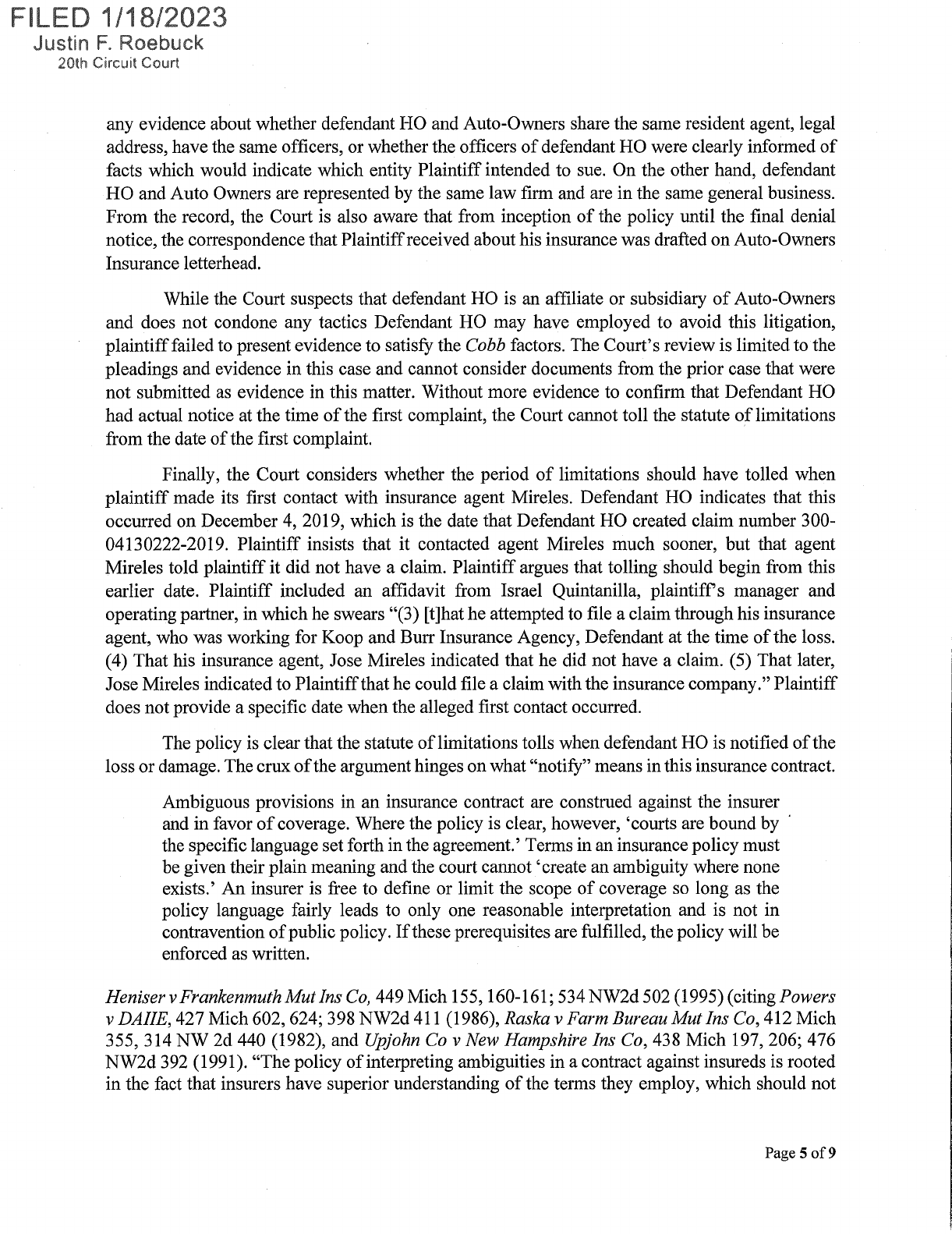
any evidence about whether defendant HO and Auto-Owners share the same resident agent, legal
address, have the same officers, or whether the officers
of
defendant HO were clearly informed
of
facts which would indicate which entity Plaintiff intended to sue.
On
the other hand, defendant
HO
and Auto Owners are represented by the same law firm and are
in
the same general business.
From the record, the Court is also aware that from inception
of
the policy until the final denial
notice, the correspondence that Plaintiff received about his insurance was drafted
on
Auto-Owners
Insurance letterhead.
While the Court suspects that defendant HO is an affiliate or subsidiary
of
Auto-Owners
and does not condone any tactics Defendant HO may have employed to avoid this litigation,
plaintiff failed to present evidence to satisfy the Cobb factors. The Court's review is limited to the
pleadings and evidence in this case and cannot consider documents from the prior case that were
not submitted as evidence in this matter. Without more evidence to confirm that Defendant HO
had actual notice at the time
of
the first complaint, the Court cannot toll the statute
o.f
limitations
from the date
of
the first complaint.
Finally, the Court considers whether the period
of
limitations should have tolled when
plaintiff made its first contact with insurance agent Mireles. Defendant HO indicates that this
occurred
on
December 4, 2019, which is the date that Defendant HO created claim number 300-
04130222-2019. Plaintiff insists that it contacted agent Mireles much sooner, but that agent
Mireles told plaintiff
it
did not have a claim. Plaintiff argues that tolling should begin from this
earlier date. Plaintiff included an affidavit from Israel Quintanilla,
plaintiffs
manager and
operating partner, in which he swears "(3) [t]hat he attempted to file a claim through his insurance
agent, who was working for Koop and Burr Insurance Agency, Defendant at the time
of
the loss.
(4) That his insurance agent, Jose Mireles indicated that he did not have a claim. (5) That later,
Jose Mireles indicated to Plaintiff that he could file a claim with the insurance company." Plaintiff
does not provide a specific date when the alleged first contact occurred.
The policy is clear that the statute oflimitations tolls when defendant HO is notified
of
the
loss
or
damage. The crux
of
the argument hinges
on
what "notify" means in this insurance contract.
Ambiguous provisions in
an
insurance contract are construed against the insurer
and in favor
of
coverage. Where the policy is clear, however, 'courts are bound by ·
the specific language set forth in the agreement.' Terms in an insurance policy must
be given their plain meaning and the court cannot 'create an ambiguity where none
exists.'
An
insurer is free to define
or
limit the scope
of
coverage so long as the
policy language fairly leads to only one reasonable interpretation and is not in
contravention
of
public policy.
If
these prerequisites are fulfilled, the policy will be
enforced as written.
Heniser v Frankenmuth Mut Ins
Co,
449 Mich 155, 160-161; 534
NW2d
502 (1995) ( citing Powers
v DAIIE, 427 Mich
602,624;
398
NW2d
411 (1986), Raska v Farm Bureau Mut Ins Co, 412 Mich
355, 314
NW
2d
440 (1982), and Upjohn Co v New Hampshire Ins Co, 438 Mich
197,206;
476
NW2d
392 (1991).
"The
policy
of
interpreting ambiguities in a contract against insureds is rooted
in the fact that insurers have superior understanding
of
the terms they employ, which should not
Page 5
of9
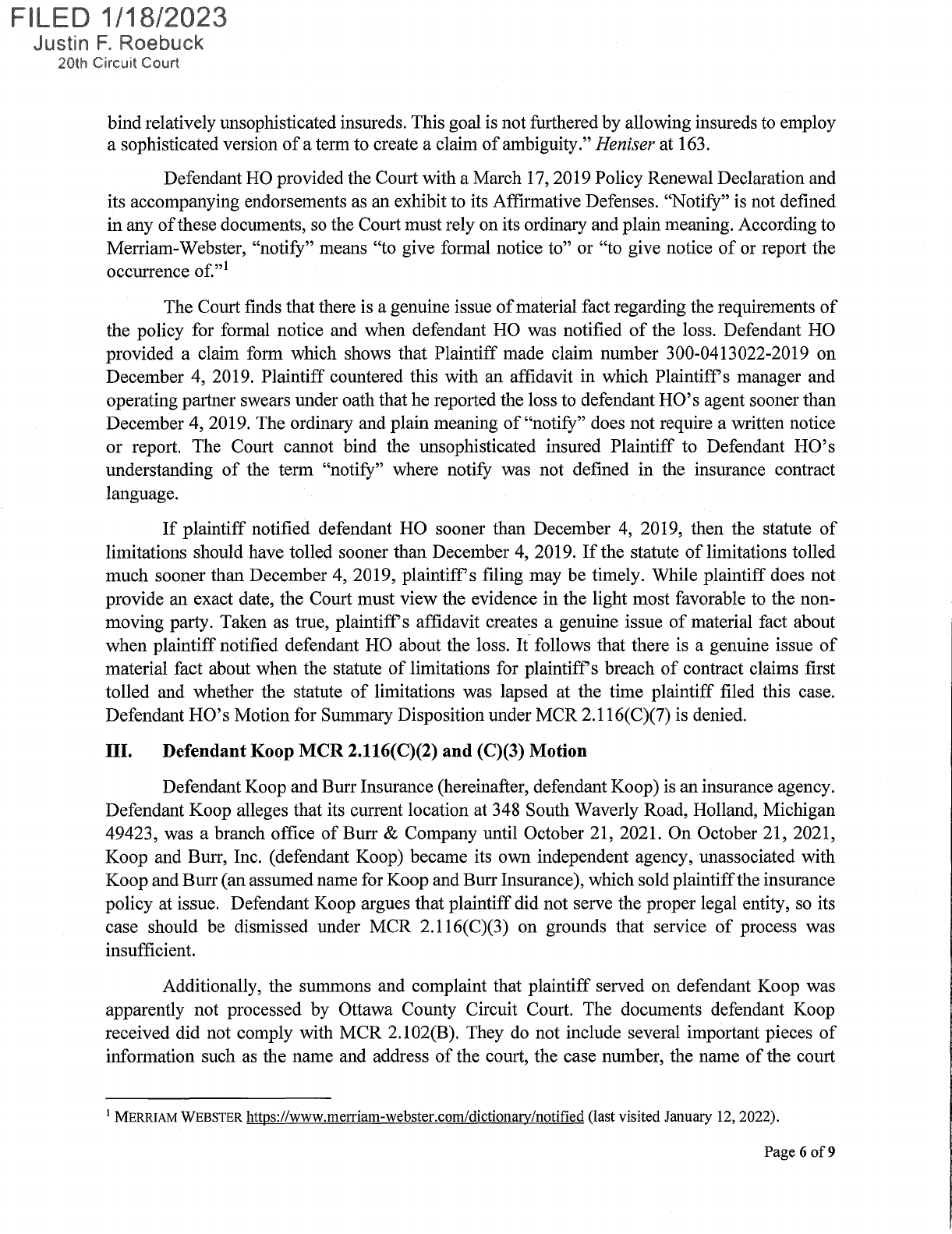
bind relatively unsophisticated insureds. This goal is not furthered by allowing insureds to employ
a sophisticated version
of
a term to create a claim
of
ambiguity." Heniser at 163.
Defendant HO provided the Court with a March 17, 2019 Policy Renewal Declaration and
its accompanying endorsements as an exhibit to its Affirmative Defenses. "Notify" is not defined
in any
of
these documents,
so
the Court must rely on its ordinary and plain meaning. According to
Merriam-Webster, "notify" means "to give formal notice to" or "to give notice
of
or report the
occurrence of."
1
The Court finds that there is a genuine issue
of
material fact regarding the requirements
of
the policy for formal notice and when defendant HO was notified
of
the loss. Defendant HO
provided a claim form which shows that Plaintiff made claim number 300-0413022-2019 on
December 4, 2019. Plaintiff countered this with an affidavit in which Plaintiffs manager and
operating partner swears under oath that he reported the loss to defendant
HO's
agent sooner than
December 4, 2019. The ordinary and plain meaning
of
"notify" does not require a written notice
or report. The Court cannot bind the unsophisticated insured Plaintiff to Defendant
HO's
understanding
of
the term "notify" where notify was not defined in the insurance contract
language.
If
plaintiff notified defendant HO sooner than December
4,
2019, then the statute
of
limitations should have tolled sooner than December 4, 2019.
If
the statute
of
limitations tolled
much sooner than December 4, 2019, plaintiff's filing may be timely. While plaintiff does not
provide an exact date, the Court must view the evidence in the light most favorable to the non-
moving party. Taken as true, plaintiff's affidavit creates a genuine issue
of
material fact about
when plaintiff notified defendant HO about the loss. It follows that there is a genuine issue
of
material fact about when the statute
of
limitations for plaintiff's breach
of
contract claims first
tolled and whether the statute
of
limitations was lapsed at the time plaintiff filed this case.
Defendant
HO's
Motion for Summary Disposition under MCR 2.116(C)(7) is denied.
III. Defendant Koop MCR 2.116(C)(2) and (C)(3) Motion
Defendant Koop and Burr Insurance (hereinafter, defendant Koop) is an insurance agency.
Defendant Koop alleges that its current location at 348 South Waverly Road, Holland, Michigan
49423, was a branch office
of
Burr & Company until October 21, 2021. On October 21, 2021,
Koop and Burr, Inc. (defendant Koop) became its own independent agency, unassociated with
Koop and Burr (an assumed name for Koop and Burr Insurance), which sold plaintiff the insurance
policy at issue. Defendant Koop argues that plaintiff did not serve the proper legal entity,
so
its
case should be dismissed under MCR
2.l
16(C)(3) on grounds that service
of
process was
insufficient.
Additionally, the summons and complaint that plaintiff served on defendant Koop was
apparently not processed by Ottawa County Circuit Court. The documents defendant Koop
received did not comply with MCR 2.102(B). They do not include several important pieces
of
information such
as
the name and address
of
the court, the case number, the name
of
the court
1
MERRIAM
WEBSTER
https://www.merriam-webster.com/dictionary/notified (last visited January 12, 2022).
Page 6
of9
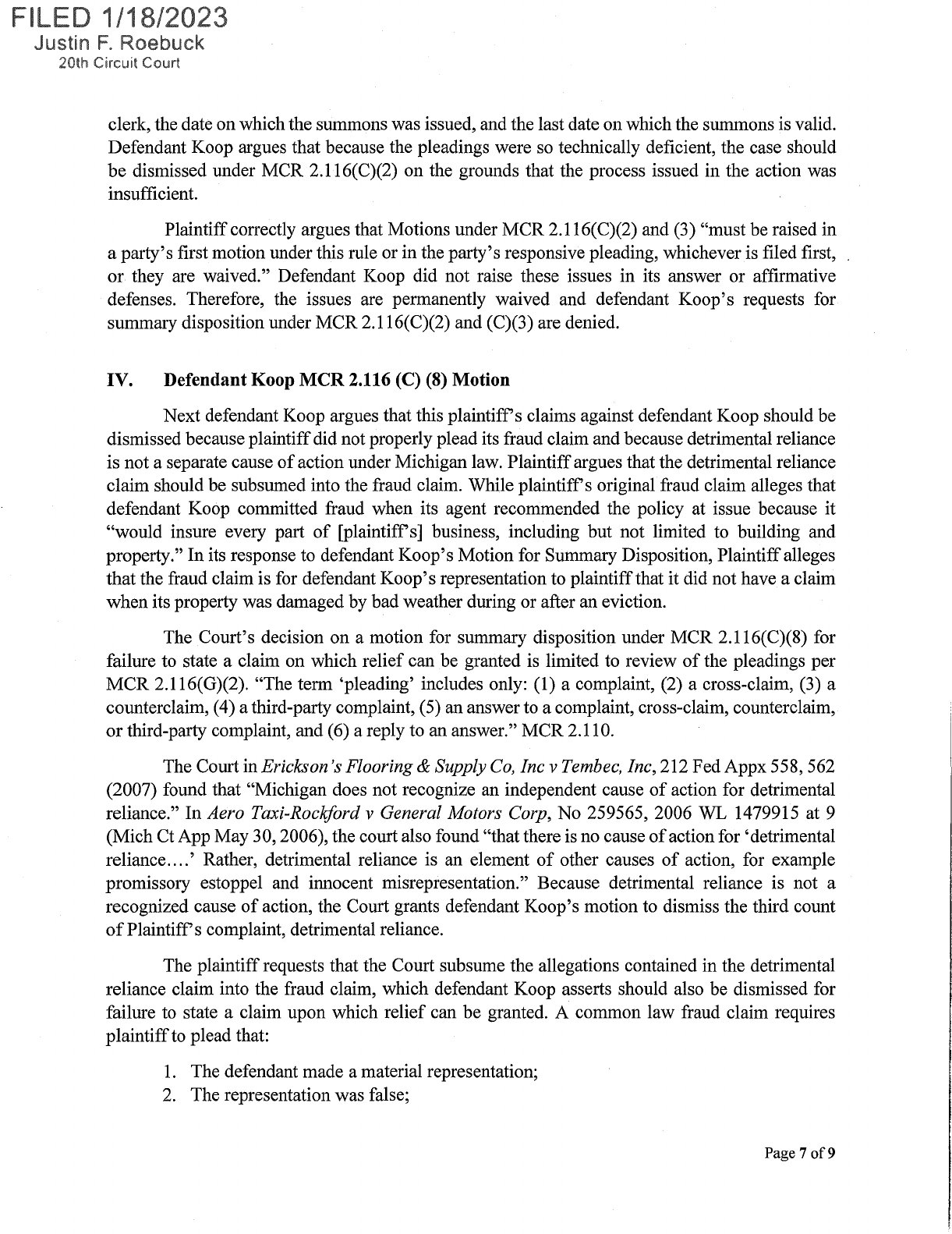
clerk, the date on which the summons was issued, and the last date on which the summons is valid.
Defendant Koop argues that because the pleadings were so technically deficient, the case should
be dismissed under MCR 2.116(C)(2) on the grounds that the process issued in the action was
insufficient.
Plaintiff correctly argues that Motions under MCR
2.
l 16(C)(2) and (3) "must be raised in
a party's first motion under this rule or in the party's responsive pleading, whichever is filed first,
or they are waived." Defendant Koop did not raise these issues in its answer or affirmative
defenses. Therefore, the issues are permanently waived and defendant Koop's requests for
summary disposition under MCR
2.l
16(C)(2) and (C)(3) are denied.
IV. Defendant Koop MCR 2.116
(C)
(8)
Motion
Next defendant Koop argues that this plaintiff's claims against defendant Koop should be
dismissed because plaintiff did not properly plead its fraud claim and because detrimental reliance
is not a separate cause
of
action under Michigan law. Plaintiff argues that the detrimental reliance
claim should be subsumed into the fraud claim. While plaintiff's original fraud claim alleges that
defendant Koop committed fraud when its agent recommended the policy at issue because it
"would insure every part
of
[plaintiff's] business, including but not limited to building and
property." In its response to defendant Koop's Motion for Summary Disposition, Plaintiff alleges
that the fraud claim is for defendant Koop's representation to plaintiff that it did not have a claim
when its property was damaged by bad weather during or after an eviction.
The Court's decision on a motion for summary disposition under MCR 2.116(C)(8) for
failure to state a claim on which relief can be granted
is
limited to review
of
the pleadings per
MCR
2.l 16(G)(2). "The term 'pleading' includes only: (1) a complaint, (2) a cross-claim, (3) a
counterclaim, ( 4) a third-party complaint, (5) an answer to a complaint, cross-claim, counterclaim,
or
third-party complaint, and (6) a reply to an answer." MCR 2.110.
The Court in Erickson's Flooring& Supply
Co,
Inc v Tembec, Inc, 212
FedAppx
558,562
(2007) found that "Michigan does not recognize an independent cause
of
action for detrimental
reliance." In Aero Taxi-Rociford v General Motors Corp, No 259565, 2006
WL
1479915 at 9
(Mich Ct App May 30, 2006), the court also found "that there
is
no cause
of
action for 'detrimental
reliance .... ' Rather, detrimental reliance is an element
of
other causes
of
action, for example
promissory estoppel and innocent misrepresentation." Because detrimental reliance is not a
recognized cause
of
action, the Court grants defendant Koop's motion to dismiss the third count
of
Plaintiff's complaint, detrimental reliance.
The plaintiff requests that the Court subsume the allegations contained in the detrimental
reliance claim into the fraud claim, which defendant Koop asserts should also be dismissed for
failure
to
state a claim upon which relief can be granted. A common law fraud claim requires
plaintiff
to
plead that:
1.
The defendant made a material representation;
2.
The representation was false;
Page 7
of9
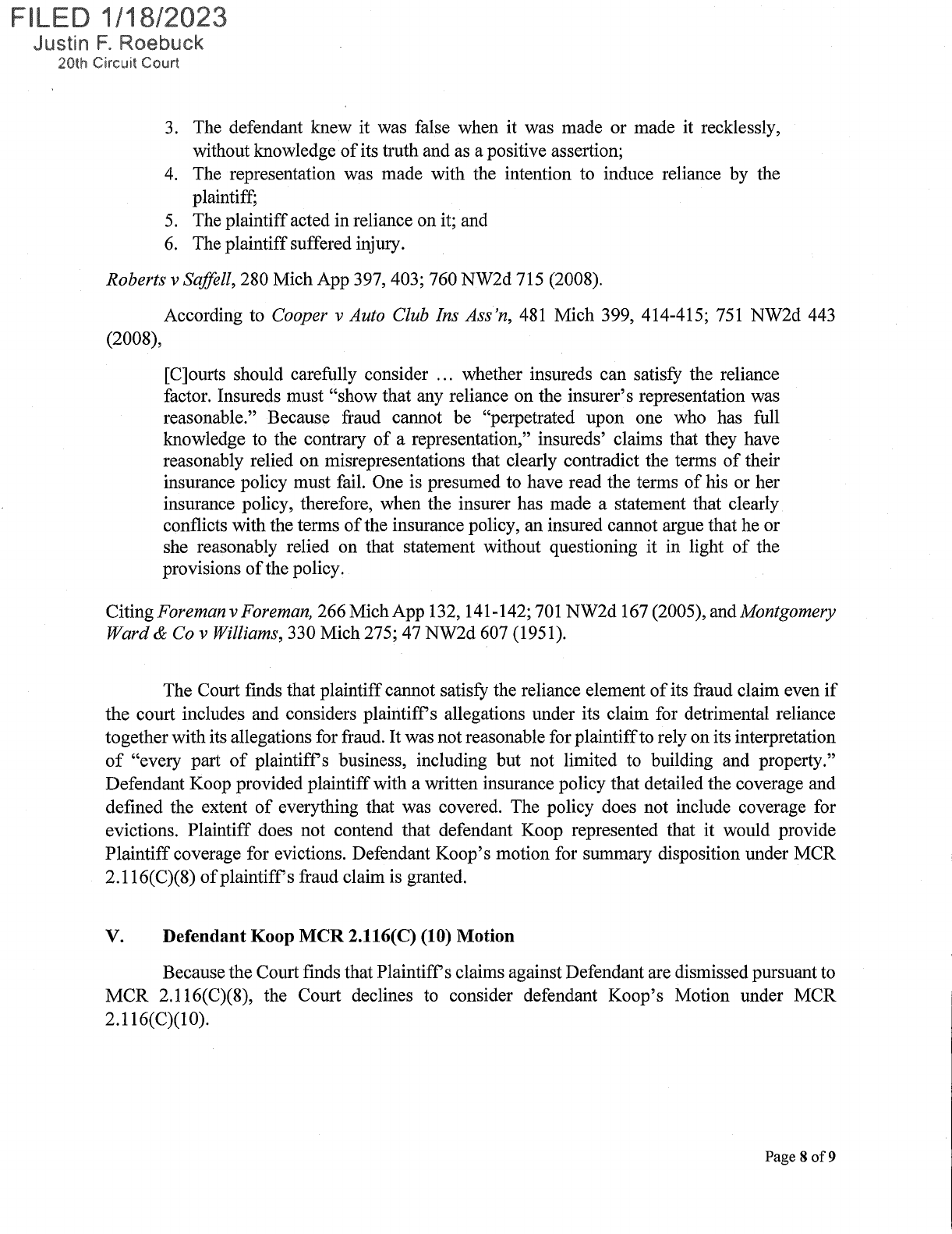
3.
The defendant knew it was false when it was made or made it recklessly,
without knowledge
of
its truth and as a positive assertion;
4.
The representation was made with the intention to induce reliance by the
plaintiff;
5.
The plaintiff acted in reliance on it; and
6.
The plaintiff suffered injury.
Roberts v Saffell, 280 Mich App 397,403; 760 NW2d 715 (2008).
(2008),
According to Cooper v Auto Club Ins Ass'n,
481
Mich 399, 414-415;
751
NW2d
443
[C]ourts should carefully consider ... whether insureds can satisfy the reliance
factor. Insureds must "show that any reliance on the insurer's representation was
reasonable." Because
:fraud
cannot be "perpetrated upon one who has full
knowledge to the contrary
of
a representation," insureds' claims that they have
reasonably relied on misrepresentations that clearly contradict the terms
of
their
insurance policy must fail. One is presumed to have read the terms
of
his or her
insurance policy, therefore, when the insurer has made a statement that clearly
conflicts with the terms
of
the insurance policy, an insured cannot argue that he or
she reasonably relied on that statement without questioning it in light
of
the
provisions
of
the policy.
Citing Foreman v Foreman, 266 Mich App 132, 141-142;
701
NW2d 167 (2005), and Montgomery
Ward &
Co
v Williams, 330 Mich 275; 47 NW2d 607 (1951).
The Court finds that plaintiff cannot satisfy the reliance element
of
its fraud claim even
if
the court includes and considers plaintiffs allegations under its claim for detrimental reliance
together with its allegations for fraud. It was not reasonable for plaintiff to rely on its interpretation
of
"every part
of
plaintiffs business, including but not limited to building and property."
Defendant Koop provided plaintiff with a written insurance policy that detailed the coverage and
defined the extent
of
everything that was covered. The policy does not include coverage for
evictions. Plaintiff does not contend that defendant Koop represented that it would provide
Plaintiff coverage for evictions. Defendant Koop's motion for summary disposition under MCR
2.116(C)(8)
of
plaintiffs fraud claim is granted.
V. Defendant Koop MCR 2.116(C) (10) Motion
Because the Court finds that Plaintiffs claims against Defendant are dismissed pursuant to
MCR 2.116(C)(8), the Court declines
to
consider defendant Koop's Motion under MCR
2.116(C)(I0).
Page 8
of9
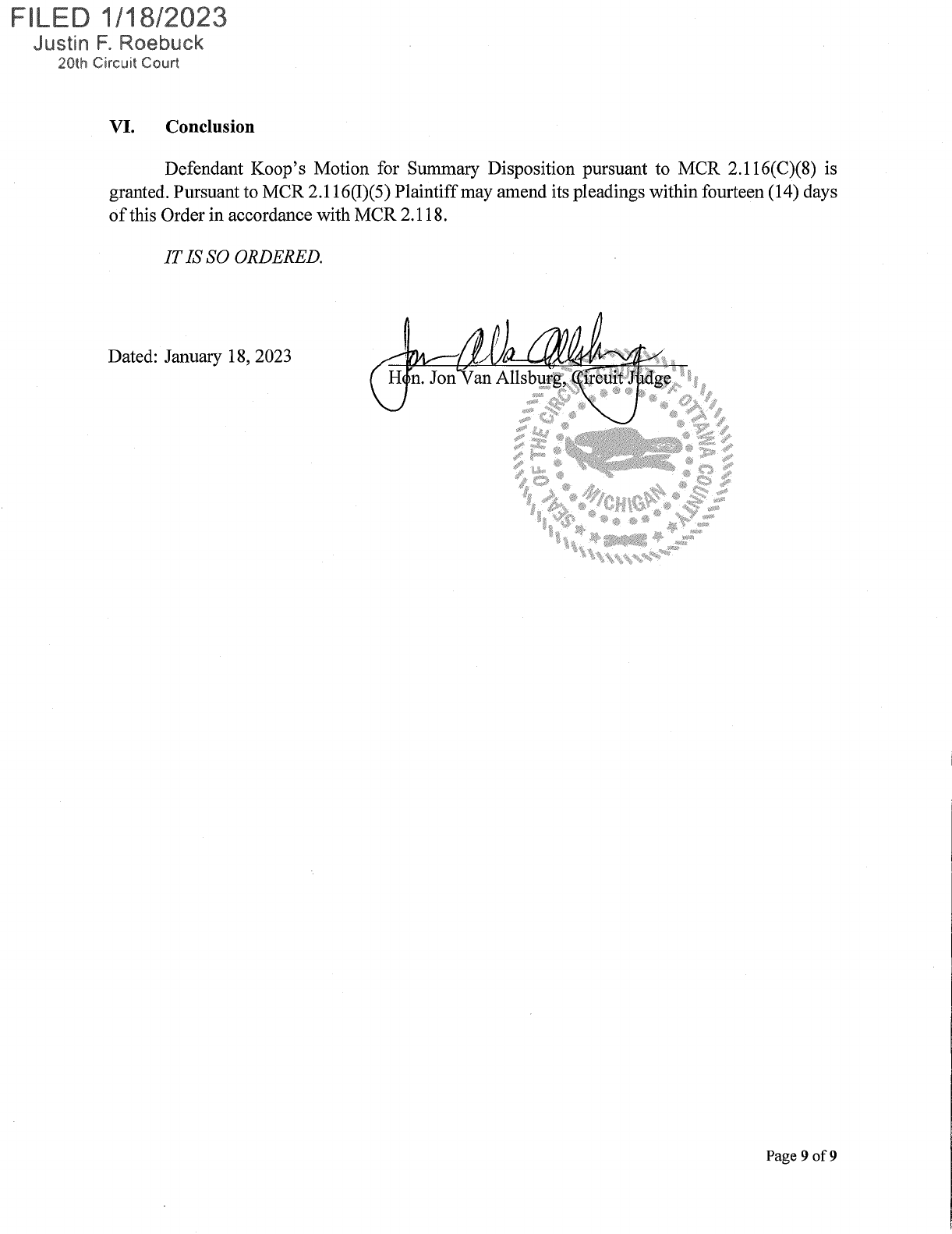
VI. Conclusion
Defendant Koop's Motion for Summary Disposition pursuant to MCR 2.116(C)(8) is
granted. Pursuant to MCR 2.116(1)(5) Plaintiff may amend its pleadings within fourteen (14) days
of
this Order in accordance with MCR 2.118.
IT
JS
SO
ORDERED.
Dated: January
18,
2023
Page 9
of9
